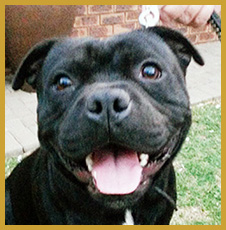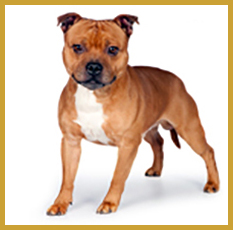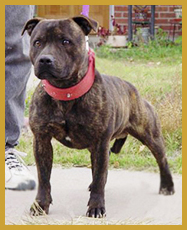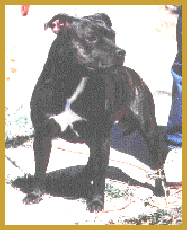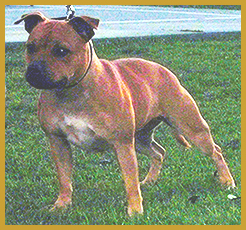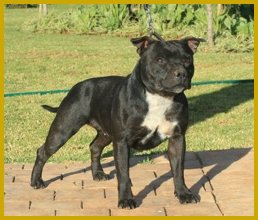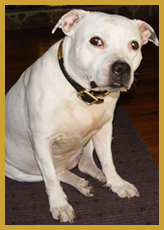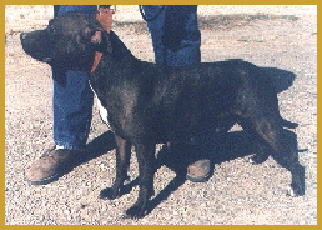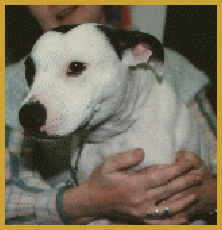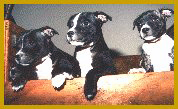Are you qualified to breed Staffords?
by Julie Neill
Breeding for the show ring can become detrimental to a breed when newcomers become so eager to acquire ribbons and trophies that they skip an apprenticeship period. Ribbons fade, trophies tarnish, glory passes, but the Breed must continue forever. (quoted from Steve Stone's article titled "Quo Vadis, Mrs. Stafford" on this web site.)
How many of us started out in Staffords by purchasing a pet, only to be talked into showing and/or breeding and ending up being bitten by the Stafford bug and spending countless hours, (not to mention money), in pursuit of breeding or showing the ultimate dog?
Every time you plan a litter or purchase a puppy do you hope for the greatest specimen ever bred? How long does it take to produce this specimen? How long is a piece of string?
The fascination of breeding is to always be searching for the unattainable but unfortunately too many of us start down this path with little or no knowledge of what we are aiming for. As Steve Stone says - "they skip an apprenticeship period" - but how long should an apprenticeship be? Who are the tradesmen? What are the skills that should be taught? How do you know when you've graduated?
In the world of Staffords, (indeed all dog showing), there are a constant stream of newcomers. Some are quickly convinced that greater involvement is not for them, some persevere for a while (3 - 6 years) then fade away and some very few stick around for the long haul. If the person is intending to mate their dog and therefore inflict their choices on the Breed they should possess some basic knowledge no matter how long they have been involved.
The problem with breeding dogs is that it's a practical subject. No amount of study is going to prepare you for the actuality. As when you bake a cake you can look up as many recipes [pedigrees] as you like but until you put the ingredients together you don't know how it's going to turn out. The advantage of study and/or experience is that you learn which ingredients go best together and which combinations should be avoided. However, even with the best recipe and ingredients in the world, the cake can still fail to rise. So to go back to the questions raised:
How long should an apprenticeship be?
There can be no hard and fast rules but I would state again that unless you know what it is you are aiming for, how can you even begin to assemble the ingredients? First you must have a fair idea of the Breed Standard as this is the basic blueprint. Second, you must have in mind a dog, (either real or composite), which represents the type of dog you hope to produce. Your perceptions of your ideal will change over time as your knowledge and appreciation of the breed increases. These two requirements are needed for your "Learners Permit" which can then be added to with practical experience and observation of the results of the litters produced by other people.
Who are the tradesmen?
To whom should you turn for the advice and direction which will help you minimize your mistakes? I believe that length of time spent with the breed, whilst not necessarily ensuring real skill, is at least a benchmark from which you can begin to assess whether a person is able to give you the advise you need. In Australia the minimum requirements to apply to be trained as a judge is at least eight years membership of the relevant Canine Authority in the past ten years; the breeding of at least three litters and the breeding or making up of at least two Champions. Shouldn't you be looking for at least that level of experience from the person giving advice? Remember too that it is always best to seek the opinion of several "tradesmen" as everyone has different ideas, and it is up to you to assess which advise you will take and which you will reject. "Tradesmen" can of course also be found in print, not just in person, and this is a good way of attaining much information before consulting with people "in the flesh."
What are the skills that should be taught?
This article does not even attempt to cover the practicalities of mating and whelping but is merely concerned with the theory of planning a mating. I believe that one of the first items on the skill agenda must be an understanding of the principles of inbreeding, line breeding and outcrossing. Next, some understanding of the possible genetic problems carried by the breed should be sought to guard where possible against producing these faults. The assessment of the potential sire and dam qualities and weaknesses as well as those of preceding generations is also a skill to be learnt.
How do you know when you've graduated?
Although as mentioned before you will never be able to produce the ultimate dog, I feel that you have graduated from your apprenticeship when you can consistently produce puppies of a quality and type with which you are happy.
You will never however finish learning there is always something popping up which causes you to back step and reconsider your position. Dog breeding is full of surprises which is what makes it such an enjoyable and absorbing hobby.
Julie Neill
